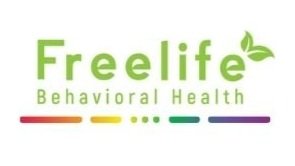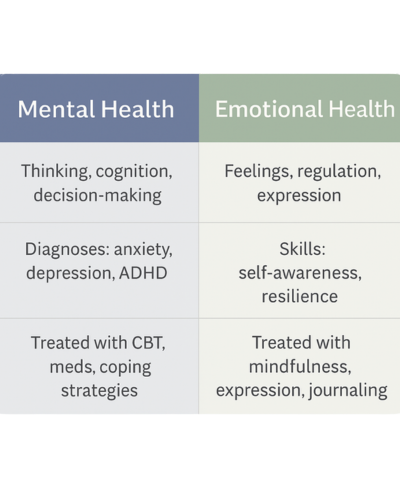
Difference Between Mental
and Emotional Health
What is the difference between mental health and emotional health?
At first glance, mental health and emotional health may seem like the same thing—but they’re not identical.
Mental health refers to your overall cognitive well-being. It involves how you think, process information, make decisions, and cope with stress. Mental health conditions often include anxiety disorders, depression, ADHD, and other diagnoses that impact thought patterns and brain functioning.
Emotional health, on the other hand, is about how you manage and express your feelings. It includes self-awareness, emotional regulation, resilience, and the ability to experience joy, sadness, anger, or fear in healthy ways.
The difference between mental and emotional health is subtle but important: mental health is how your mind processes and organizes thoughts, while emotional health is how you interpret and respond to feelings.
Can you have good mental health but poor emotional health?
Yes, it’s possible. For example:
Someone might have no diagnosable mental health condition (good mental health) but still struggle with expressing anger or managing conflict (poor emotional health).
Another person may be intellectually sharp and productive but suppresses sadness or avoids vulnerability.
The difference between mental and emotional health matters here because therapy may focus on different goals: improving thought patterns for mental health, and improving feeling expression for emotional health. While they influence each other, one can lag behind the other.
Why is emotional health important?
Emotional health impacts nearly every area of daily life:
Relationships: Being able to express love, set boundaries, and resolve conflict helps connections thrive.
Work and school: Emotional regulation reduces burnout and improves teamwork.
Physical well-being: Poor emotional health can increase stress, which in turn affects sleep, immunity, and even heart health.
Without strong emotional health, even those with good mental health may feel unfulfilled. That’s why understanding the difference between mental and emotional health helps people see where they may need extra support.
More Than Affirming. We're Part of the Community.
Therapy at FreeLife is about understanding, connection, and growth. Our therapists, all members of the LGBTQ+ community, bring a unique perspective and deep empathy to their work. We provide a safe, inclusive space for individuals of all identities to explore, heal, and thrive, offering care grounded in authenticity and expertise.
Therapy for LGBTQIA+ Individuals
at Every Stage of Your Journey
A Space for Honest Conversation,
Skill Building, and Resilience
Life comes with unique joys and challenges, and everyone deserves a safe, affirming space to explore their experiences. Our therapists are here to guide you with compassion and understanding. We proudly specialize in LGBTQIA+ affirming therapy while welcoming and supporting individuals of all backgrounds and identities.
How are emotional and mental health treated in therapy?
Therapists often work with both, but the approaches may differ:
Mental health treatment: Focuses on reducing symptoms, challenging unhelpful thought patterns, and teaching coping strategies. Cognitive Behavioral Therapy (CBT) or medication management are common tools.
Emotional health treatment: Emphasizes building self-awareness, learning to express feelings safely, and practicing emotional regulation. This may include mindfulness, journaling, or role-playing exercises.
Many therapy sessions integrate both. For example, a client might explore anxious thought patterns (mental health) while also learning to name and express the emotions behind those thoughts (emotional health). Understanding the difference between mental and emotional health ensures therapy is tailored to the whole person.
Are emotional and mental health connected?
Absolutely. They influence each other constantly:
Poor emotional health (like bottling up feelings) can worsen mental health, increasing risks of anxiety or depression.
Mental health struggles (like obsessive thoughts) can overwhelm emotional stability, leading to irritability or sadness.
This connection means therapy works best when it treats both. At Freelife Behavioral Health, we emphasize the difference between mental and emotional health while also recognizing how intertwined they are. Supporting one often strengthens the other, leading to long-term growth and resilience.
Getting Started is Easy
To get started, fill out the form below and we will reach out for your free consultation.








